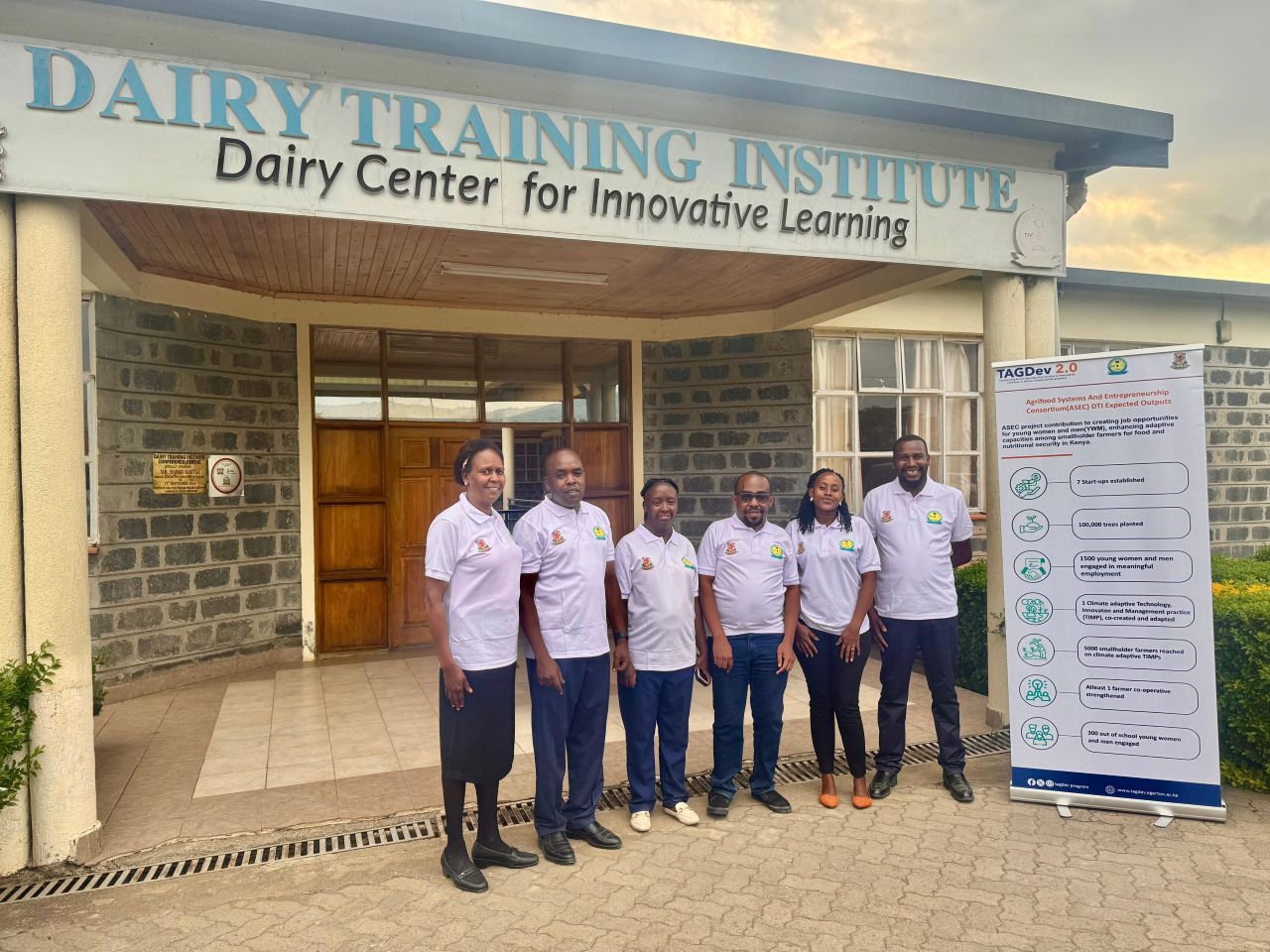- +254 794 062325
-
This email address is being protected from spambots. You need JavaScript enabled to view it.
-

On June 18, 2025, the Dairy Training Institute (DTI) Naivasha held a stakeholder meeting to officially launch the Agrifood System & Entrepreneurship Consortium (ASEC) project under the TAGDev 2.0 program, Egerton University. The event, chaired by the Institute’s Principal and ASEC Team Leader, Mr. Abraham Biwott, brought together approximately 30 participants from diverse sectors, including government agencies, local cooperatives, community-based organizations, and private enterprises. The meeting served both as an introduction to the ASEC project and a strategic forum to explore collaborative pathways for achieving its core objectives, which include youth empowerment through dairy entrepreneurship, environmental sustainability, gender and social inclusion, and policy engagement for systemic impact.

DTI Naivasha ASEC team during the launch The event attracted a wide and representative group of stakeholders from Naivasha, Gilgil, and Ol’joro-Orok sub-counties. Participants included departmental heads from DTI, officers from the Ministry of Agriculture, Livestock, and Cooperatives at both county and national levels, representatives from the Kenya Dairy Board, Kenya Forestry Service, Sheep and Goat Station, and the Livestock Recording Centre, as well as local administrators such as area chiefs and Members of County Assembly (MCAs). Leaders from community organizations and private sector actors also attended, reflecting strong interest in the project’s inclusive development agenda. Organizations represented included Eagle’s Green Developers, Team Climate Change Naivasha, KAMWE CBO, Eden Thriving, Banadesh Women Group, Reno Agri-foods & Dairy Academy, Aim Far, Oljoro Foods Ltd, CAP Youth Empowerment Institute, Uhotani SACCO, and the Mai Mahiu Flood Victims Chairperson.
Discussions during the meeting revolved around five interlinked themes: youth inclusion, dairy entrepreneurship, environmental sustainability, gender and social inclusion, and policy engagement. They emphasized the need to strengthen youth participation in the dairy value chain through enterprise development, technical training, and mentorship. There was a shared recognition of the importance of adopting climate-smart dairy practices to enhance environmental resilience and sustainability. Gender and social inclusion were also strongly emphasized, with calls to ensure that women and marginalized groups are fully integrated into all phases of the project. Policy representatives highlighted the need to align ASEC activities with both local and national policy frameworks to enhance sustainability and institutional backing.
Beyond formal presentations, the event provided a space for open dialogue, visioning, and inter-sectoral collaboration. Stakeholders reflected on their potential roles and proposed concrete strategies to support DTI Naivasha in realizing the ASEC vision. By the end of the session they had established a strong foundation for partnership and expressed commitment to continued collaboration through technical support, knowledge exchange, and resource mobilization. The meeting concluded with a unified call to action to work together toward transforming the dairy sector using inclusive, innovative, and sustainable approaches.
-

On 29th May 2025, Dairy Training Institute (DTI) in Naivasha officially launched the Agri-Food Systems and Entrepreneurship Consortium (ASEC) project, under Egerton University's TAGDev 2.0 program (Transforming African Agricultural Universities to Meaningfully Contribute to Africa's Growth and Development.) The launch marked the beginning of a four-year initiative aimed at empowering young women & men and local farmers through entrepreneurship training, climate-smart agriculture, and improved livelihoods. By promoting hands-on learning, enterprise development, and sustainable farming innovations, the project seeks to bridge the gap between agricultural education and community needs.
The Egerton University TAGDev 2.0 secretariat led by the Program Coordinator Prof. Nancy Mungai joined DTI ASEC staff for the onboarding exercise. which was characterized by a strong spirit of collaboration and active engagement. Participants took part in interactive discussions, hands-on sessions, and joint planning activities that reinforced shared ownership of the project.
During the launch, TAGDev secretariat delivered a comprehensive presentation outlining the project’s objectives, timelines, and the specific roles of partner institutions. This was followed by group sessions where the DTI team and other stakeholders engaged in dialogue to translate broad project goals into actionable strategies. The sessions allowed for open questions, feedback, and the co-creation of a clear roadmap for implementation.
During the launch, the DTI team gave a comprehensive presentation outlining their delivery approach and implementation strategies along the dairy value chain, with a specific focus on dairy goats. Emphasizing a farmer-centered and skills-based model, the team highlighted their intent to promote dairy goat farming as a sustainable, inclusive, and climate-resilient enterprise for smallholder communities. Their approach integrates practical training, community demonstration units, and mentorship programs designed to equip youth and local farmers with the knowledge and tools to manage breeding, nutrition, health, and milk processing.
DTI’s strategy also includes fostering linkages with markets and cooperatives to ensure value addition and consistent income streams. Significantly, the team explained how the expansion of the dairy goat value chain presents opportunities for job creation among young people, not only as farmers, but also as input suppliers, animal health service providers, milk aggregators, processors, and entrepreneurs in value-added dairy products. By tapping into the growing demand for goat milk and its derivatives, the project aims to unlock sustainable livelihoods and empower a new generation of agripreneurs.
Operating under the broader TAGDev 2.0 framework and supported by the Mastercard Foundation through RUFORUM, the ASEC project is designed to strengthen institutional capacity in agri-food systems and equip both youth and communities with the tools and skills to thrive in a changing agricultural landscape. Its core themes agripreneurship, job creation, food system security, gender equity, and community-driven innovation reflect a comprehensive approach to inclusive agricultural transformation.
With DTI and Egerton University now working together, the ASEC project is not only going to strengthen institutional capacities but also ignite lasting change for young women and men. By investing in youth, advancing inclusive agripreneurship, and promoting climate-smart practices, the initiative carries the promise of reshaping agri-food systems and cultivating a new generation of leaders committed to sustainable development in Kenya and beyond



